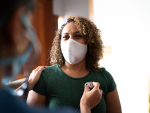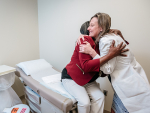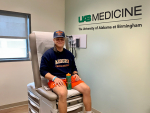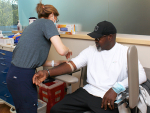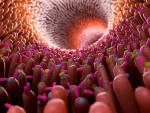Displaying items by tag: school of medicine
The holiday season is a time when family members get together to share a meal; doctors recommend using this opportunity to learn more about one’s family history.
Hear personal tales of heartbreak and loss, tenderness and pain, and hope and reconciliation for the fourth annual StoryPower, presented by UAB Arts in Medicine.
Tagged under
When Cameron Monistere was diagnosed with cancer right before his senior year of college and final season as an Auburn University cheerleader, he acted fast. With the help of UAB experts, Monistere is now cancer-free and using his story to raise awareness about men’s health.
Tagged under
Type 2 diabetes is alarmingly on the rise in Alabama youth, but following a healthy diet and exercising regularly can help mitigate the risk and the severity.
Tagged under
Terry also won the Social Change, Talent and Spirit awards, earning a total of $3,300 in scholarships.
Tagged under
- release
- student affairs
- honors college
- collat school of business
- college of arts and sciences
- school of medicine
- school of education
- bioinformatics
- department of genetics
- department of accounting and finance
- department of kinesiology
- department of biology
- department of chemistry
- department of computer science
- department of human studies
- alys stephens center
- students
Experimental neonatal chronic lung disease is marked by a redox imbalance that damages the lungs, and that damage can be ameliorated using a live biotherapeutic mixture of three Lactobacillus species.
Tagged under
Three UAB employees share their diabetes journey and provide healthy tips in honor of Diabetes Awareness Month.
Tagged under
Tagged under
The Heersink School of Medicine has achieved eight years of accreditation — the highest level available for medical schools across the U.S. — by the Liaison Committee on Medical Education after a rigorous two-year process.
Tagged under
UAB Sports and Exercise Medicine, UAB Department of Family and Community Medicine, the Professional Athletes Foundation of the NFL Players’ Association, and Living Heart Foundation partnered together to conduct free cardiac exams, neurological exams, orthopedic health exams, and exercise, nutrition and mental health screenings for former players.
The Alabama Department of Public Health shows widespread flu activity in all areas of the state. UAB’s Rachael Lee, M.D., urges the public to enact preventive measures to slow the spread of flu, and to ease the burden on health care systems.
Tagged under
The event will raise awareness for prostate cancer, which is one of the biggest health issues facing men, while also helping raise funds for UAB’s Program for Personalized Prostate Cancer Care.
Tagged under
A UAB study including more than 20,000 ventricular assist device recipients showed that patients diagnosed with familial dilated cardiomyopathy had better clinical outcomes compared with other DCM diagnoses.
Tagged under
- release
- office of the president
- office of the provost for student and faculty success
- uab strategic plan
- school of medicine
- oneal comprehensive cancer center
- department of medicine
- division of infectious diseases
- department of surgery
- uab medicine
- department of clinical and diagnostic sciences
- division of cardiovascular disease
- division of endocrinology diabetes and metabolism
- students
This finding suggests utility of treatments before fecal microbial transplants to reduce recipient microbial communities. This would help donor microbial strains dominate in the recipient.
Tagged under
The ADNP/ketamine trial was the first clinical study generated by a information gleaned from the Precision Medicine Institute’s artificial intelligence tool.
Tagged under
This project aims to investigate how the immune system contributes to kidney stones and whether variations in dietary oxalate intake affect immune function.
Tagged under
The summit addressed cervical cancer as a public health problem in Alabama and discussed solutions to devise a roadmap to implement these solutions.
Tagged under
Jim Parsons, an Alabamian and registered organ donor, helped further donation and xenotransplant when his family donated his body upon death for a groundbreaking scientific study conducted at UAB earlier this year.
Tagged under
